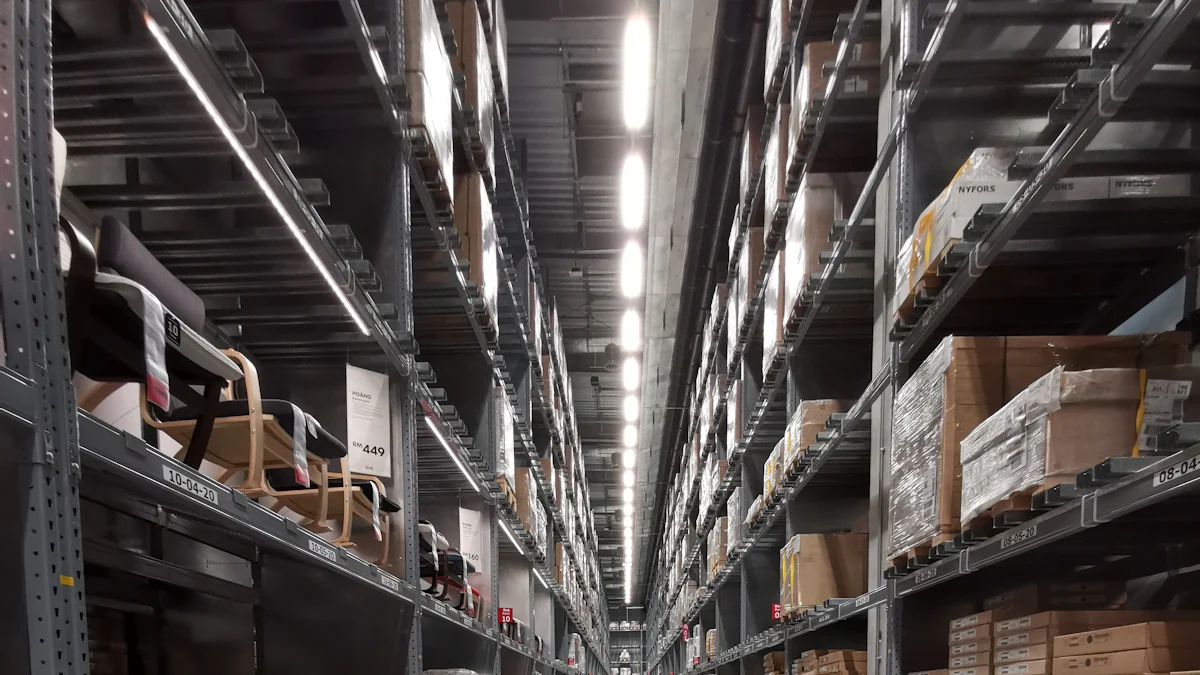Unlocking Efficiency: AI Supply Chain Innovations

Supply chain efficiency is paramount in today's competitive market landscape. AI supply chain innovations have revolutionized traditional practices, enhancing decision-making processes and operational effectiveness. Leveraging artificial intelligence transforms supply chains by automating complex tasks and predicting demand trends with precision. This technological advancement not only optimizes production, inventory management, and distribution but also ensures cost savings and customer satisfaction. Embracing AI solutions in supply chain management is the gateway to a more efficient and resilient future for businesses worldwide.
AI in Supply Chain Planning

In the realm of supply chain planning, AI supply chain innovations are reshaping traditional approaches and ushering in a new era of efficiency. By harnessing the power of artificial intelligence, businesses can optimize their operations with unparalleled precision and foresight.
Demand Forecasting
When it comes to demand forecasting, predictive analytics stands at the forefront of innovation. By analyzing historical data and identifying patterns, predictive analytics enables organizations to anticipate market trends and consumer behavior accurately. This proactive approach empowers businesses to align their production schedules and inventory levels seamlessly, minimizing wastage and maximizing profitability.
Market patterns and weather data play a pivotal role in enhancing demand forecasting accuracy. Leveraging AI algorithms to process vast amounts of data from diverse sources allows companies to gain valuable insights into external factors that influence demand fluctuations. By integrating market patterns and weather data into their forecasting models, businesses can adapt swiftly to changing conditions, ensuring optimal resource allocation and production planning.
Production Optimization
In the realm of production optimization, resource allocation is a critical aspect that can make or break operational efficiency. AI tools enable organizations to allocate resources judiciously based on real-time demand forecasts and production requirements. By optimizing the allocation of labor, materials, and equipment, businesses can streamline their production processes and enhance overall productivity.
Production scheduling is another area where AI-driven solutions shine brightly. By leveraging advanced algorithms to analyze production workflows and identify bottlenecks, companies can create optimized schedules that minimize idle time and maximize output. This proactive approach not only improves operational efficiency but also ensures timely delivery of products to customers.
Embracing AI in supply chain planning is not just a technological upgrade; it's a strategic imperative for businesses looking to stay ahead in today's fast-paced market landscape. By harnessing the transformative potential of artificial intelligence, organizations can drive efficiency, productivity, and strategic decision-making across every facet of their supply chains.
AI in Inventory Management

In the realm of AI supply chain innovations, inventory management plays a pivotal role in ensuring operational efficiency and customer satisfaction. Leveraging advanced AI algorithms, businesses can optimize their inventory processes with unparalleled accuracy and foresight.
Inventory Optimization
When it comes to inventory optimization, AI-powered tools provide companies with the capability to analyze vast amounts of data swiftly and accurately. By leveraging historical demand and supply trends, businesses can determine optimal stock levels that prevent overstocking or understocking situations. This level of precision not only minimizes storage costs but also ensures products are readily available when customers need them.
C3 AI Inventory Optimization: Applies cutting-edge AI, machine learning, and optimization techniques to minimize inventory levels while maintaining service level agreements.
AI for Efficient Inventory Management: Automates replenishment orders and optimizes stock levels to enhance customer satisfaction by ensuring product availability.
By integrating AI-driven solutions into their inventory management processes, organizations can achieve significant cost savings and operational efficiencies. These tools enable businesses to balance inventory levels effectively, reducing the risk of stockouts while optimizing resources for improved profitability.
Stock Levels
Optimizing stock levels is crucial for businesses looking to streamline their operations and meet customer demands efficiently. With AI-powered tools, companies can analyze real-time data to adjust stock levels dynamically based on demand forecasts. This proactive approach not only minimizes excess inventory but also ensures that products are always available when needed.
DEAR Inventory: Utilizes AI for multi-warehouse management and batch tracking to optimize stock levels effectively.
*AI Analytics Platform for Inventory Management*: Reads terabytes of data in seconds to achieve zero defects in managing stock levels efficiently.
By harnessing the power of AI in managing stock levels, businesses can enhance their supply chain visibility and responsiveness. These technologies empower organizations to make data-driven decisions that optimize their inventory processes for maximum efficiency.
Reorder Points
Establishing optimal reorder points is essential for maintaining a seamless flow of goods within the supply chain. Through AI-driven tools, companies can set reorder points based on demand patterns and lead times, ensuring timely replenishment of stocks. This strategic approach minimizes delays in production cycles and prevents disruptions in product availability.
AI-powered Tools for Inventory Optimization: Determine reorder points by analyzing demand trends, avoiding production delays.
AI for Supply Chain Planning and Inventory Management: Improves decision-making by setting accurate reorder points based on real-time data analysis.
By incorporating AI into setting reorder points, organizations can enhance their supply chain resilience and agility. These technologies enable businesses to adapt swiftly to changing market conditions while maintaining optimal inventory levels throughout their operations.
Quality Control
Quality control is a critical aspect of AI supply chain innovations that ensure products meet stringent standards before reaching customers' hands. By leveraging AI technologies, businesses can monitor product quality with precision and identify defects early in the production process.
Monitoring Product Quality
Monitoring product quality through AI-driven solutions enables companies to detect deviations from quality standards promptly. By analyzing production data in real time, organizations can identify anomalies or defects before they impact the final product's integrity. This proactive approach not only enhances product quality but also boosts customer satisfaction by delivering flawless goods consistently.
AI-powered Tools for Quality Control: Monitor product quality through real-time data analysis for consistent high-quality standards.
AI-driven Tools for Inventory Management: Enhance customer satisfaction by ensuring products meet quality standards through continuous monitoring.
Integrating AI into monitoring product quality empowers businesses to uphold their brand reputation and build trust among consumers. These technologies provide organizations with the capabilities to maintain stringent quality control measures throughout their manufacturing processes.
Identifying Defects
Identifying defects early in the production cycle is crucial for preventing costly rework or recalls down the line. With AI algorithms analyzing production workflows, companies can pinpoint potential defects before they escalate into larger issues. By implementing automated defect detection systems, organizations can streamline their quality control processes and minimize disruptions in production schedules.
AI Algorithms for Defect Identification: Identify defects early on through automated systems that analyze production workflows.
AI-powered Tools Enhancing Quality Control: Streamline defect identification processes for efficient manufacturing operations without delays.
By embracing AI technologies for defect identification, businesses can improve operational efficiency and reduce waste within their manufacturing processes significantly. These tools enable organizations to uphold high-quality standards while optimizing their production workflows seamlessly.
AI in Distribution
In the realm of AI supply chain innovations, distribution plays a crucial role in ensuring seamless product delivery and customer satisfaction. Leveraging advanced artificial intelligence technologies, businesses can optimize their distribution networks for maximum efficiency and cost-effectiveness.
Route Optimization
Optimizing routes is essential for businesses looking to minimize transportation costs and enhance delivery speed. By utilizing AI algorithms to analyze historical data and real-time traffic conditions, companies can identify the most efficient routes for their shipments. This proactive approach not only reduces fuel consumption but also ensures timely deliveries to customers, improving overall service quality.
AI-powered Route Planning Tools: Utilize machine learning algorithms to optimize routes based on traffic patterns and delivery schedules.
Route Optimization Software: Enhances cost savings by identifying the shortest and fastest routes for product distribution.
Implementing AI-driven route optimization solutions empowers businesses to streamline their logistics operations and achieve significant cost savings. These technologies enable organizations to adapt swiftly to changing market demands while maintaining high standards of service excellence.
Cost Savings
Achieving cost savings is a primary goal for businesses seeking operational efficiency in their supply chains. With AI-enabled route optimization, companies can reduce fuel expenses, vehicle maintenance costs, and overall transportation expenditures. By selecting the most cost-effective routes, organizations can maximize their budget allocations and allocate resources more effectively.
AI Algorithms for Cost-efficient Routing: Analyze fuel consumption data to identify routes that minimize transportation costs.
Cost-saving Strategies with AI Route Optimization: Optimize delivery schedules to reduce overtime expenses and improve resource utilization.
Integrating AI into route optimization processes not only enhances cost-effectiveness but also improves overall supply chain performance. These technologies provide businesses with the tools needed to make informed decisions that drive profitability and sustainable growth.
Risk Management
Managing risks within distribution networks is essential for safeguarding business operations against disruptions and uncertainties. By leveraging AI technologies, organizations can proactively identify potential risks and implement mitigation strategies to protect their supply chains from unforeseen events.
Identifying Disruptions
Identifying potential disruptions before they escalate is critical for maintaining operational continuity in supply chain management. Through AI-powered risk assessment tools, companies can analyze historical data and external factors to predict potential disruptions accurately. This foresight enables organizations to take preemptive measures, such as rerouting shipments or adjusting inventory levels, to mitigate the impact of disruptions effectively.
AI-driven Disruption Identification Systems: Analyze historical data trends to predict potential disruptions in advance.
Proactive Measures with AI Risk Management Tools: Implement contingency plans based on disruption forecasts to ensure operational resilience.
By incorporating AI into risk management practices, businesses can enhance their ability to respond swiftly to unexpected events while minimizing downtime and financial losses. These technologies empower organizations with the insights needed to navigate complex supply chain challenges successfully.
Proactive Measures
Taking proactive measures is key to building a resilient supply chain that can withstand various challenges effectively. With AI-driven risk management solutions, companies can develop proactive strategies that anticipate potential risks and vulnerabilities within their distribution networks. By implementing preventive actions based on predictive analytics, organizations can strengthen their supply chain resilience and ensure continuous operations even amidst uncertainties.
AI-powered Predictive Analytics Tools: Forecast potential risks based on historical data analysis for proactive risk mitigation.
Strategic Planning with AI Risk Assessment Models: Develop contingency plans that address identified risks proactively for enhanced operational preparedness.
Embracing AI technologies in risk management not only enhances operational preparedness but also fosters a culture of agility within organizations. These innovative solutions enable businesses to stay ahead of disruptions, protect their assets, and maintain a competitive edge in today's dynamic market environment.
AI has the potential to revolutionize supply chain operations by improving decision-making and efficiency. AI-driven software helps businesses automate complex processes, enhance data analytics, and improve decision-making accuracy, crucial for optimizing supply chain efficiency and reducing operational costs. The future of AI in the supply chain looks very encouraging as it enables more effective data integration from multiple sources, leading to accurate demand forecasts and better supply planning. As we look to the future, the role of AI in inventory management is set to grow even further, offering exciting opportunities for businesses ready to embrace this transformative technology.
See Also
Exploring Tomorrow's Supply Chain: AI Integration Perspectives
Transforming Transportation: The Influence of Supply Chain Advancements
Price Surge Analysis: Managing Supply Chain Interruptions
Optimizing Remedies for Advanced Manufacturing's Supply Chain Challenges
